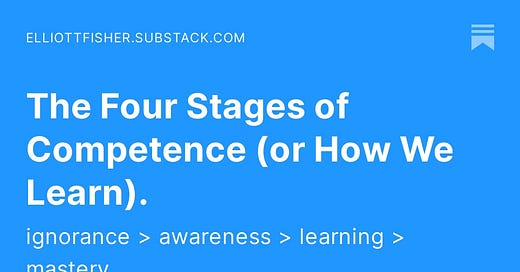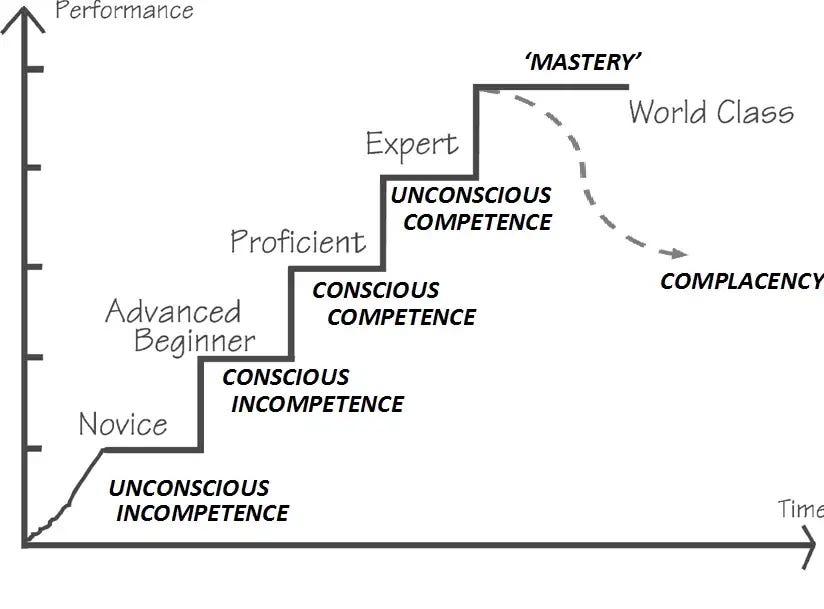What was the last skill you learned? For me, if I’m not learning then I’m not living, and if I’m not living, well, then, I’m dying.
But how exactly do we learn? As much as we’d like to be like Neo from the Matrix and be able to download new skills like Kung Fu, we follow a much different path.
Back in 2017 I found myself responsible for a startup’s accounting and FP&A and I quickly realized just how much I didn’t know about how to actually do the job well. Sure I could figure out how to pay vendors and chase customers for unpaid invoices, but what kept me up at night, the real hair-pulling stress, was that I was responsible for work I didn’t have the skills to do well, like building a three-statement financial model.
While I eventually learned how to do the job I also learned the vital steps involved with learning: The Four Stages of Competence.
Step 1: Unconscious Incompetence (or Ignorance)
The first step in learning is not even knowing what you need to know in order to do whatever “it” is well. We’re blind to what we need to know… let alone able to do it. Said bluntly: we’re incompetent.
In my role, I didn’t know there was even a difference between cash and accrual accounting, let along how that impacts the financial statements and health of a business.
Step 2: Conscious Incompetence (Awareness)
We’re on our way to learning once we become aware of what we don’t know. Queue the sleepless nights… It’s not much, but hey at least we’re no longer ignorant. Once aware only then can we start to ask the right questions as well as seek for context, background content and answers. We’re still incompetent, but at least we know about it. We’re on our way to learning.
For me, I was aware of what I needed to know to do my job in the short term (properly accrue revenue & expenses on the P&L and be able to prepare, read and discuss a statement of cash flows) as well as what I would need to learn in the long term (how accounting informs financial models, how to run a variance, how to prepare internal & external reports, etc.)
Step 3: Conscious Competence (Learning)
After becoming aware of our ignorance, we’re on our way to learning. How did we get here? Through practice, experience and asking questions. This is a stage that we think of in acquiring a new skill and it’s where a lot of the work happens. We spend a lot of time in Step 3 to get the reps in and to learn how to do things well and correctly.
Because I closed the books monthly, I got regular and consistent practice in accounting, financial modeling, and talking about our financial position. Multiple this by several years and I start to establish a regular rhythm and understanding to these new skills. I can talk about them confidently, answer questions, as well as know where to find gaps in my knowledge base.
Step 4: Unconscious Competence (Mastery)
Ah, Step 4, the last and final step. Step 4 seems to be where Neo starts. In this last step, we’ve gone through all of the stages of learning and acquiring a new skill, and as a result are often much for the wiser from the experience.
In this fourth and final step, we’re able to perform, teach and answer questions without hesitation. We know the material inside and out, truly displaying a mastery on the topic or subject. Malcolm Gladwell claims you become a master after about 10,000 hours so I still have some more to go. But nonetheless, mastering anything is an aspiration, a pursuit, a lifelong goal.
I don’t think I’ll become a master in finance or in accounting. But I know enough (conscious competence) to do what I need to do.
So for all you lifelong learners out there, enjoy the process!




